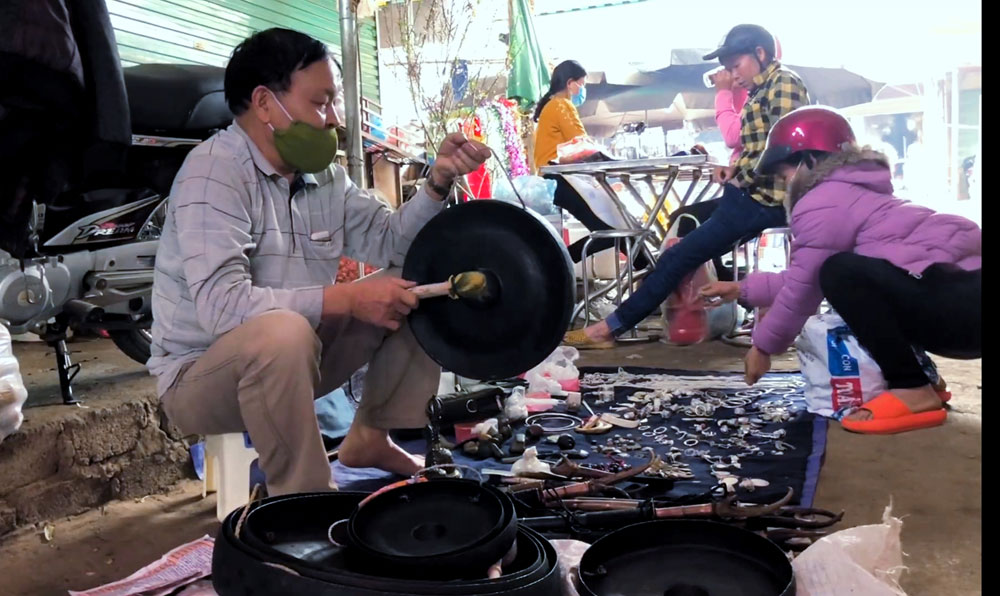
(HBO) - Vo Market happens twice a week, with the Sunday session being the busiest. The market offers all kinds of things, from clothing, footwear to necessary items and agricultural tools. It particularly still preserves many features of a traditional wet market.
.jpg) A Muong ethnic minority man
sells traditional products of his people at Vo Market.
A Muong ethnic minority man
sells traditional products of his people at Vo Market.
Located in Vo Street, Nhan Nghia
Commune, Hoa Binh’s Lac Son District, Vo Market has been popular for many
generations as a marketplace for not only local people but also those from
neighbouring communes, such as Van Nghia, My Thanh, Tuan Dao, Tan Lap, Mien Doi
and Quy Hoa.
It is a very bustling and crowding
market where people come for not only selling and buying but also chitchatting
weekly.
Though many new markets, such as Chieng
Market (Tan Lap) and Sao Market (Tuan Dao) have been established in nearby
communes as part of the local new-style rural building campaign, Vo Market
remains the busiest and most crowded one thanks to its long history.
Displayed at the market are various
traditional farm produces, including Ri chicken, eggs, wild-caught shrimps and
freshwater crabs, bamboo shoots among others.
There are also a wide range of hand-made
cultural products of Muong ethnic minority people, from gongs, to traditional
clothing, brocade items, offering a unique experience for first-time visitors.
Vo Market is held from early morning to
noon./.
With an increasingly vibrant and widespread emulation movement aimed at building cultured residential areas and cultured families, Yen Thuy District has been making steady progress toward improving both the material and spiritual well-being of its people, while fostering a civilized, prosperous, beautiful, and progressive community.
Once lacking recreational spaces and community facilities, Residential Group 2 in Quynh Lam Ward (Hoa Binh City) has recently received attention for the construction of a new, spacious, and fully equipped cultural house. The project followed the model of state support combined with public contributions in both labor and funding.
The "All people unite to build cultural life" movement, which has been effectively integrated with Kim Boi district’s socio-economic development goals, is fostering a lively spirit of emulation across local residential areas, hamlets, villages, public agencies, and enterprises. In addition, through the initiative, traditional cultural values are being preserved and promoted, while community solidarity and mutual support in poverty reduction and economic development are being strengthened.
A working delegation of the Hoa Binh provincial People’s Committee led by its Permanent Vice Chairman Nguyen Van Toan on June 11 inspected the progress of a project to build the Mo Muong Cultural Heritage Conservation Space linked to tourism services in Hop Phong commune, Cao Phong district.
Born and growing in the heroic land of Muong Dong, Dinh Thi Kieu Dung, a resident in Bo town of Kim Boi district, in her childhood was nurtured by the sweet lullabies of her grandmother and mother. These melodies deeply imprinted on her soul, becoming an inseparable part of her love for her ethnic group's culture. For over 20 years, this love for her hometown has driven Dung to research, collect, and pass down the cultural values of the Muong people to future generations.
In the final days of May, the Ethnic Art Troupe of Hoa Binh Province organized performances to serve the people in remote, mountainous, and particularly disadvantaged areas within the province. These were not just ordinary artistic shows, but they were the meaningful journeys aimed at spreading cultural values, enhancing the spiritual life of the people and contributing to the preservation of ethnic minority cultural identities.



.jpg) A Muong ethnic minority man
sells traditional products of his people at Vo Market.
A Muong ethnic minority man
sells traditional products of his people at Vo Market.